#lancelot should be involved in every arthur love triangle
Explore tagged Tumblr posts
Text
Let me hit you with my Shade!Lancelot idea, keeping in mind I haven't seen that episode of Merlin yet. (This works for both established Arwen/established Merthur and Gwencelot/Mercelot in my mind so think of it whichever way you'd like but it does focus on Lancelot, Merlin, and Arthur.)
So! Morgana creates Shade!Lancelot using Lancelot's body and sends him back to Camelot to stir up trouble. Instead of trying to just break up Arthur and Gwen, he's meant to isolate Arthur and make him believe that he can't trust anyone except for Aggravaine.
So he flirts with Gwen, takes the knights out to have fun when they should be training/distracts them, and takes Merlin's attention away from Arthur as well, frustrating Arthur.
S!Lancelot and Aggravaine both place doubts in Arthur's mind directly as well and S!Lancelot realizes that Merlin betraying Arthur would be far worse than anyone else and sets his sights on Merlin instead.
So he keeps stealing Merlin away when Arthur needs him, makes comments about how he knows Merlin better than Arthur ever could and about how he knows Merlin sneaks away but he's loyal to Merlin over Camelot (which also upsets Arthur because that's one of his knights for god's sake!) and won't tell him where Merlin is going.
Arthur confronts Merlin about his sneaking away (magic things) and, when he refuses to tell the truth, Arthur thinks he can't trust him after all.
Merlin talks about having magic in front of S!Lancelot and, when he doesn't know what Merlin's talking about, Merlin becomes suspicious. He references something that didn't happen and S!Lancelot acts like he remembers that which confirms his suspicions but when he tries to sidle away out of the room to tell someone, S!Lancelot attacks him, attempting to choke him out.
Arthur finds them like this and S!Lancelot says that Merlin was sending information to Morgana so he had to subdue him which Arthur doesn't believe for ONE SINGLE MINUTE. Thus, they begin to duel as Merlin tries to recover his breathing and stop from passing out in the corner.
S!Lancelot attempts to kill Arthur and knocks him out, Arthur fading out with the last thing he sees being Merlin trying to push S!Lancelot's killing blow away as his servant stands.
Somehow (I'm thinking earlier in the ep Merlin finds a magical crystal that can hold souls released from the afterlife that Gaius is researching and Lancelot's real soul gets released during the ep and the crystal glows and maybe gets broken in the scuffle) Merlin pushes the Shade from Lancelot's body and his real soul is able to return to his body.
The Shade's form changes into a kind of Shadow Monster Lancelot and duels the real Lancelot now (who is very shaken and weak because he was just revived!) and, when he stabs the Shade, it does no damage. The Shade laughs and says that he can't be killed without magic and Lancelot says that then he'll just have to kill it like he killed the Griffin.
"You're a knight of Camelot and you're saying that you used magic to kill a Griffin?"
"No. I did." Merlin says, casting the same spell he did all those years ago on Lancelot's blade as he stabs through the Shade, killing it.
There's a beat where Merlin still isn't sure if it's the real Lancelot and asks him something only the real Lancelot would know, which he answers and they have a tearful/huggy reunion.
Arthur wakes up and they explain that it was a creature sent by Morgana and Lancelot is actually back with them now.
Later, when Merlin is getting Arthur ready for bed, Arthur tells him that he doesn't need to know where he goes off to because he trusts him. Merlin goes to tell him the truth but stops and thanks him instead, snuffing out the candles and shutting the door as he leaves.
(I want to hopefully write this one day but I will need to actually catch up and watch the episode first to get the vibes. Everything I know about it rn is from clips and gifs and such)
#bbc merlin#merlin#lancelot#arthur pendragon#fic idea#merthur#mercelot#lancelot should be involved in every arthur love triangle#i think this story could've worked in the show with gwen becoming queen as well#(keeping in mind I haven't seen S4)#but maybe instead of this happening the day before the wedding instead it's Aggravaine and Morgana doing their takeover#so the wedding happens later#and then there's triangle stuff with both Arwen and Merthur#it could also happen without Arwen#because I think either way Morgana should've focused her attention on driving a wedge between him and Merlin#and this way!#Lancelot returns!#I'm fine with main characters dying if it's done well#*eyes the show carefully*#like i said#if it's done well#also i think every love triangle in this show can be solved by polyamory#and I'm a big Arcelot supporter#Lancthur?#idk
80 notes
·
View notes
Note
... okay I didn't want to copy you but I'm also dying to hear your Guinevere Thoughts

She is Everything to me.
I honestly like every Guinevere (that isn't a blatant misogynist caricature, that is). I like her when she's betraying Arthur and attempting to destroy his kingdom. I like her when she's trying to do everything right. I like her when she's just trying to find happiness where it comes, and she finds it in Lancelot, and then that ruins everything and she didn't even mean to. Honestly Guinevere is kind of like Gawain for me in that she's such a flexible character with so many ways you could portray her, and it took me a looong time to form any sort of solid opinion on her character?
Okay so first of all I think that dream Arthur had (in Layamon's Brut I think?) of her tearing down Camelot from the foundations is SO sexy. Oh my God. Guinevere should get to destroy more buildings and feature in more unsettling prophetic dreams.
My one opinion across all Guineveres is that I think this character should be slightly unsettling. Like I respect the people who write her as really friendly and down-to-earth, but I do think she's genuinely just sort of uncanny. She's one of those people where you look at her and go, "what is UP with her," but there's nothing up with her, beyond being Guinevere. Basically someone who SEEMS supernatural but definitely is not.
I don’t think Arthur and Guinevere really love each other. A lot of modern media interprets them as part of a love triangle where Guinevere feels things for both of them, but Arthur’s reaction to Lancelot’s rescue of Guinevere in Le Morte D’Arthur is to say that he could replace Guinevere, but he’s never going to have knights like the ones Lancelot killed again. You could argue that he’s speaking from a place of hurt and doesn’t really mean it, but also, Gawain put more effort into trying to prevent Guinevere from getting burned at the stake then Arthur did. I don’t think you’d do that to someone you loved even if they did commit adultery. Regardless of that whole debacle, though, I think it’s pretty rare that we see Arthur and Guinevere being close. You don’t really see them be affectionate with each other. I think it was 100% a political marriage and I honestly don’t think Arthur was really up for a relationship after what happened with Morgause? Like that was a really traumatic experience for literally everyone involved. So Guinevere ends up in a loveless marriage, which isn’t unexpected for their society but definitely is not ideal for her. Why shouldn’t she love Lancelot? Why shouldn’t she be happy with a man who loves her? Or attempt to be happy, at least?
Guinevere and Lancelot in Knight of the Cart are just !!! He’s the one who CAN drop everything and work tirelessly to rescue her. He doesn’t have to put his country before her. He doesn’t just treat her as an equal, he treats her as a saint or even a god. It’s been a long time since I’ve read Knight of the Cart (God I really need to reread it), but there’s this quote from it on the back cover of my edition that says, “Lancelot bowed low and adored her, for in no holy relic did he place such faith,” and I think about that ALL the time. Guinevere is a quasi-religious figure for Lancelot and I think that’s so cool and interesting. He loves her to the point of idolatry and it’s AMAZING. Honestly Guinevere and Lancelot really are one of the top ten dynamics of all time. They’re kind of weird in that I’m not even sure if I actually ship them, but they ARE one of my favorite relationship dynamics. (I honestly don’t know that I have any specific ship for Guinevere, tbh??)
I think she’s kind of a cold person. Like not a bad person, just kind of distant from everyone except her few close friends. You never know Guinevere until you do and then you know everything about her. Also I like to think about her being friends with the orkney siblings? Gawain and Guinevere are both terrifying and they are both friends <3 And I think even the ones who don’t necessarily get along with her still respect her, and she respects them. I don’t know, I just think her relationships with all of them have a lot of potential to be interesting
I think she has a LOT of potential as an antihero, but unfortunately I feel like sometimes people can be a little (or a lot) misogynist about her when they write her on the darker side of the moral spectrum?? Like come on. How hard can it be to make her evil and INCREDIBLY cool? I think she deserves it! Like it’s 100% cool to write her as a morally good character and I like it just fine when she’s written like that, but I also think it’s cool when basically every character is at least kind of morally grey and I think setups like that work really well for Arthuriana. Also I think she deserves to be able to commit crimes <3
By “fans that did the character dirty” I specifically mean writers trying to either girlboss-ify her and failing miserably or else just writing her as some generic nice girl (or, worst of all, doing BOTH, I am looking at you, Guinevere Deception). Someday I will find a retelling that does her justice! Admittedly I haven’t read very much modern Arthuriana.
This is like a very mild pet peeve but I kind of don’t like it when modern adaptations portray her as a sorceress or a warrior queen. Like YES she deserves to kill people but I kind of got the impression that the stories I’ve read had her as a warrior queen/sorceress because they couldn’t imagine a normal woman still being cool and worth something. Anyway I’m not like opposed to it per se, but I think Guinevere is more of a strategist than a fighter, it’s just the way I see her. I want someone to give me political mastermind Guinevere. Like I remember her being involved in the court in Chretien’s stories! That was really cool and I would like to see more exploration of Guinevere as a political figure! I also think there are other Arthurian women that are more interesting to reinterpret as warriors and/or sorceresses. Someone give me warrior queen Morgause or something. I do think it definitely could be a valid decision to give Guinevere a sword if writers aren’t just doing this because they want a girlboss and that’s the only way they can imagine a female character being girlboss or whatever. I think she would use a sword to cause problems on purpose, which is a win in my book, I love it when she causes problems on purpose. Someone get her a sword.
Wait totally off-topic, but for some reason now I’m imagining an adaptation where Guinevere is reminiscent of Ning Yi, the hero of The Rise of Phoenixes? I’m not sure if you’ve seen the drama but basically Ning Yi is so smart and so weird and he somehow manages to be emotional and really collected at the same time. Honestly his emotional expression is usually a carefully curated performance. I’m probably doing a bad job explaining him because it is so hard to encapsulate this character in a few sentences but please know that he is addicted to scheming, an evil genius and also at one point I remember he bites?? the heroine’s arm?? affectionately?? I watched it at like fifteen but I remember that and it Haunts me. I wish someone would write her like this.
Admittedly I headcanon basically every character I like as bi and/or ace until proven otherwise, but I think Guinevere is bisexual. She just seems like she has bisexual vibes
Also I’m slowly working my way through the Vulgate Cycle right now and she’s honestly something else so far. She’s slightly sarcastic and just so mean and then Lancelot is over here ready to burst into tears at the first opportunity and he keeps spacing out and walking into rivers. They’re both amazing to me.
Also also!! I love her friendship with Isolde. Aren’t they like close friends in Le Morte D’Arthur and then Isolde sends her a letter about how Guinevere, Lancelot, Tristram, and Isolde are the only true lovers in the land or something? It’s been a while since I skimmed Le Morte D’Arthur but I seem to remember that. Anyway I think someone should write a story where Guinevere and Isolde are in love or something <3
(Honestly I am tempted to ramble about Guinevere even more but this post is getting long. Anyway, thanks for the ask!!)
Character bingo thing
16 notes
·
View notes
Note
Salty Ask list: 9. Most disliked arc? Why?, 20. What is the purest ship in the fandom?, and 27. Least shippable character? The saltier the better!!!
Thank you for the ask, anon!! 💜💜
OK, I will answer both 9 and 10 (because the most disliked arc is no. 10 😅) I have already answered some of these earlier, so I will copy/paste those, if that’s OK!
9. Most disliked character(s)? Why?
For Merlin:
Agravaine. He’s just the worst. So greasy and sleazy and just, yuck. Yuck, overall. He’s not even one of those characters one can love to hate, like, for example, Uther, who is also simply the worst, but who will preoccupy you in ways you never saw coming! When it comes to Agravaine, everything about him was so thoroughly hateful, frustrating and unenjoyable, the highlight of the entire season was finally watching him go splat against the wall! The second most hated is that girlfriend of Gwaine’s at the very end that was plying him for information. That entire sequence is just so mind-numbingly infuriating, I can’t even think of it without getting angry. It almost ruined Gwaine for me entirely.
For The Untamed:
Oh, finally an easy one!! 😂😂 Wen Chao, Wang Lingjiao and Wen Zhuliu are in a tight race for the first place here and who is winning depends entirely on who I’m looking at in that precise moment! Of course, Wen Ruohan and Wen Xu can get into the hate bucket too, but they were so bland and boring, they cannot really compare. Jin Guangshan is also the worst, I can’t stand him. The only reason I hate the Wens more is that Jin Guangshan is actually a competent villain on a higher scale of villainy than the previous lot. Jin Zixun is also awful, a ridiculously unredeemable character on every front and Su She can also have an honourable mention.
10. Most disliked arc? Why?
For Merlin:
Oooh! There are so many!! But I think the ones that I rant about the most often are those related to Gwen! Everything about Gwencelot makes me rage! I dislike him and how he treated her and just do not see this epic ~love~ there, at least not on his part, yet they kept bringing him back to mess up her life over and over again.
Mind you, I am not the biggest fan of Arthur in this context either, he was a terrible boyfriend (though a somewhat better husband because Merlin picked up the slack), even though Arwen >>> Gwencelot by miles and miles. I hated how he would break up with her every five minutes over nonsense and then come crawling back. I hated how she always immediately forgave him, all grateful and relieved, and I always felt like she didn’t really have a choice because the power imbalance between them was staggering. Plus, the fact that she was the one who nursed Uther in his last months after everything he had done to her, and that Arthur had let it happen, infuriates me to no end.
My loathing for that whole cheating arc is infinite. I hate how the writers could not make up their minds about what they wanted to do with her. On the one hand, they were such cowards in their attempts to keep her ideologically pure, they had already sacrificed a lot of her quirkiness and character to suit Arthur’s needs and wants and to make him look good, so they were reluctant to have her actually cheat because it would undermine him. I don’t understand why they even had to have that entire arc if they were so afraid to go there. She was supposed to be under mind-control, and then they pointed out that the spell works by bringing suppressed emotions to the forefront! Why was that necessary? I mean, you can’t have it both ways! Either do it and own it, or just leave it alone! It would have been so easy to have her choose Lancelot and develop a proper romance there, and then to have Lancelot die, and Gwen fall in love with Arthur afterwards, as he supports her while she grieves. But, no, they had to take this cheap shot at her and humiliate her and have her cleaning pigsties just so that Arthur can angst about it for a few episodes. I am forever mad.
I also dislike the whole evil!Gwen arc (though a part of me did enjoy watching her go apeshit after quietly swallowing so much injustice throughout the entire five seasons of this show). I feel like they were intentionally undermining the character and her entire relationship with Arthur. The whole cheating nonsense so late into season 4 had already done so much damage, then they went and pulled this poorly-thought-out crap in the second half of season 5, when emotions were already running high and nobody was in the mood to be forgiving of someone trying at and almost succeeding in killing Arthur, who was so much more beloved among the viewers than her. Just imagine how much better spent that time would have been if they had... oh, I don’t know, developed Mordred more and given him a proper reason to turn against Arthur!
Ugh 😒
For The Untamed:
I dislike the whole Yanli/JZX romance. I don’t know what he’s like in the novel and the other adaptations, but he gets on my very last nerve in the drama and I never actually saw him do anything meaningful to redeem himself for all the crap he pulled and all the humiliation he piled on to her. I also don’t like the whole Yin Iron nonsense. It just doesn’t tie in properly and the plot holes and inconsistencies it leaves behind are gaping and huge (but, happily, nobody is watching this for the Yin Iron plot 😆). There had to have been better things to do there, especially since it is something that does not exist in the source material. The worst parts of the drama for me somehow always tie back to the Yin Iron.
20. What is the purest ship in the fandom?
For Merlin:
Hmmm… when it comes to the most popular ones, I think none of them, because they all get complicated and dark to some degree. But on a platonic level, when it comes to friendships, I would go with Merwen, Merlance and Merwaine. Merlin and Gwen are delightful together, but I have a hard time shipping them romantically without Arthur, there is just no path forward for me there that does not involve him too, and that tips the dynamic into something much more complicated (but still happy for all three of them because I am so not down for jealousy and competition between Merlin and Gwen, Arthur has two hands and he can damn well use them).
I also think that Lancelot’s love for Merlin was pure, but I just don’t ship it at all and think that there was never anything there except for friendship (I can see Arlance going sexual, though). The same goes for Gwaine, I think that he loved Merlin unconditionally, and as far as friendship goes, it is pure, but if I ship them sexually, then all purity goes out of the window, not just as far as the sex is concerned (because the sex they would be having would be positively filthy) but also because I just can’t imagine a universe in which Merlin does not love and desire Arthur more. The angst, the pain and the darkness are off the charts.
As for the less popular ones, I think the purest is Percival/Elyan regardless of whether you see it as romantic or platonic. There is just so much mutual love, admiration and respect between them! No angst, no lies, no triangles, no drama, just taking care of and supporting each other and living in domestic bliss.
For The Untamed:
WangXian, no contest. They fell in love as kids and continued to love each other for the rest of their lives, even beyond death. The way they love each other is so absolute and so selfless! They both respect and admire the other, they are so supportive and accepting of each other, quirks, flaws and all, and they kind of set the gold standard as far as relationships go!
27. Least shippable character?
For Merlin:
Eh... this is a tough one. I actually had to step away from this question and think about it and I didn’t come up with anything because the entire main and recurring cast is very shippable. There are, however, characters that aren’t shipped as much as they could be (Elyan, baby, you deserve better 😢), and then there are also characters that result in unsavory ships that are best left unmentioned (but because these are salty asks, I am going to mention them anyway).
The first one that came to my mind was Gaius, but he is actually very shippable because there is no rule that says you have to ship him in the canon timeline. He has a serious canon het love interest, and a crack one as well. Also, let’s not forget Uther. I’ve seen the fandom float this one as a crack ship, but it is actually very serious and plausible. There is so much complicated history there, decades of it, and definitely a deep, albeit toxic relationship that can absolutely be (and likely even was) sexual. If I was less busy and more inclined to get anon hate, I would totally be open to writing it myself.
I have seen a lot of people list Uther as an answer here, but Uther is very, very shippable! Anthony Head is handsome and charismatic, and he has so much presence as Uther, he could have chemistry with drywall if the script called for it. Again, there is no rule stating that a ship should be wholesome and happy, so let me go over the most obvious ones. When it comes to m/m ships, I already mentioned Gaius, plus I definitely felt it whenever the neighbouring kings came over to visit Camelot (my personal favourite was Lord Godwyn). Uther also has three canon het ships (why, yes, I am counting the troll), most notably Ygraine and Viivienne, and he is 100% shippable with Nimueh (though I prefer Nimueh with Ygraine). Last but not least, there is Morgana. It is squicky incest, yes, but it is also very obvious, if you have the inclination to go there. My jaw was on the floor on my first watch when he confessed that she was his actual biological daughter, because up until then, I totally thought that things would get sexual between them in canon.
Agravaine is also an obvious (I would even go as far as to say a semi-canon) ship for Morgana. Do I hate it? Yes. Do I think she slept with him to get him to deliver her Arthur’s head? Again, absolutely, yes. Even Kilgharrah is very shippable and he is a giant firebreathing lizard (obviously, laws of physics require transmorphing him into something smaller and (hopefully) human-shaped for the p0rn).
For The Untamed:
Jin Zixun and Jin Zixuan. I am forever mad Jin Zixuan (somehow) ends up having sex in canon anyway. My first thought for this was Wen Chao, but no, he is absolutely shippable. Like I said, the ship does not have to be nice, and Wen Chao is very nasty, but also very sexual (plus, there is always Wen Zhuliu).
The one character that I personally am the least inclined to ship is Wen Ning because he is so childlike and it feels like he never mentally developed into an adult.
Salty Asks
5 notes
·
View notes
Text
Merlin Rewrite #6: Morgana and Gwen’s Relationship
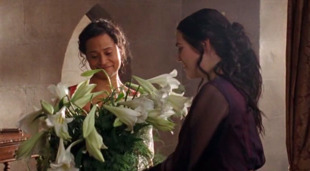
This relationship between Gwen and Morgana is not really talked about much in the fandom nor the show, and I think that’s a shame. I touched upon this friendship in both Morgana’s and Gwen’s respective posts, but I feel like this topic deserves it’s own focus.
We always knew that the main friendship of the show was between the two guys Merlin and Arthur. They took the center stage of the conflict as the manservant and the King. Their interactions started out tumultuous but later they grew to care about one another as close friends.
The Morgana and Gwen friendship was set up as a perfect foil to Merthur. Inversely, they started out as close friends but later became enemies because of their alliances. However, this direction of their relationship was not because the writer’s gave them the time and attention they needed to develop, but merely because that’s what parties they were coincidentally on. Gwen was on the good side, so Morgana had to hate her when she turned evil, even though it didn’t make any sense.
Their Relationship on the Show
We saw snippets of Morgana and Gwen interacting in season 1. They have a friendly relationship, and Morgana is very kind to her despite being her mistress. Morgana came to Gwen’s defense when she and her father were both put in jail, and even tried helping her father free himself later. Gwen risks her life in helping Morgana save Mordred, and they both team up together to help Merlin later on. Even though they had a lot of great moments showing their friendship, they were always in the background of the conflict, never at the forefront like Merthur.
Then Season 2 came around. Gwen started spending a lot more time with Arthur and Merlin, and whenever Morgana wasn’t the center of the episode she seemed to be missing entirely. We got a good display of their friendship in “Lancelot and Guinevere” when Morgana does everything in her power to get a rescue squad sent out to Gwen but that was about it. After that, their interactions all but stopped and Morgana turned evil and everything went down hill.
This lack of interaction made absolutely no sense to me because Gwen seemed to trust Morgana. Would she really not say a thing about her feelings for Arthur to Morgana? Wouldn’t Morgana be for Gwen X Arthur because she didn’t believe in the class system? Or maybe Morgana would try to push Gwen onto Lancelot knowing he likes her and is also a civilian like her (thus furthering that love triangle like the show was trying to do already)? These are the types of scenes I’d expect form Morgana and Gwen but we didn’t get them because the writer’s stopped caring about Morgana’s relationships after they decided to make her evil!
Like I said in my Morgana rant, Morgana suddenly turned evil in season 3 for no reason, and in turn, suddenly started hating Gwen for no reason.
Morgana comes back in season 3, heartlessly murdering anyone who comes in her way. The murdering part is very OOC, but her anger is somewhat in character. To some extent she understandably hates Merlin for betraying her, hates Arthur for idealizing Uther, and hates Gwen...for some reason. She is willing to use Gwen and her brother as bait for Arthur (even though she almost turned against Uther to save Gwen’s father previously), has a dream where Gwen becomes Queen and FREAKS out, and callously tosses her life aside numerous times. Morgana’s treatment of Gwen was probably one of the things that made her “transition” to evil very OOC and unbelievable. There was no reason for Morgana to hate Gwen so much. Even her anger at Merlin and Arthur didn’t justify the extent of her violent behavior, so her anger at Gwen made even less sense. Again, it was just another way for the writers to toss aside Morgana’s character complexity to give the show a steady villain.
In reality, if Morgana really went to the dark side she wouldn’t target Gwen so much because she saw Gwen as one of the people Uther targeted.
How it Should Have Been Done
Merlin and Arthur have so many big and small moments showing their dedication to one another, showing how they grow together. Arthur has made big sacrifices for Merlin and vice versa. However, the problem with the show was that after season 1 Merthur became more important than everyone else. Every relationship, including Morgana and Gwen’s, took a backseat. Like I mentioned in my first rewrite post, the conflict between Merthur (the magic revelation) didn’t happen at the very end of the series, so there was no separation or time for them to interact significantly with other characters. It would have been much more beneficial for the show to give all the characters dynamic relationships that allowed them to interact with each other and explore different sides to their personality.
I would also have Morgana and Gwen’s relationship start off good, hit a roadblock, and have them find their way back to each other. Their relationship would be great until Morgana turns to the dark side (but doesn’t completely turn evil, again only doing so to further her own purpose).
Gwen would want to be loyal to Morgana and help magical people, the way she helped with Mordred. However, Morgana joining the side that directly opposes Camelot would give Gwen pause, because she grew up in the Kingdom and loves it and wouldn’t want anything to threaten it. She would be conflicted between her friend and what she perceives as a threat to her home.
I can see Gwen turning completely against Morgana when she learns (somehow) that Morgana was ultimately the one responsible for her father’s death. Gwen begins to resent magic as it was the cause of her father’s death, and in turn begins to resent Morgana for partaking in magic and hurting her father. As Gwen grows closer romantically to Arthur, she begins to resent Morgana as well and this puts a strain on their friendship. This situation would give a more complex view on their relationship and have it go bad gradually and realistically. This type of revelation would also help in Morgana’s struggle in finding the right way to fight for magical people’s rights without hurting others.
At this point, Morgana would be away from Camelot, figuring out her own path and dealing with the dark forces without becoming unreasonably evil. Like I mentioned before, I could see a situation where Gwen is kidnapped and Arthur goes to save her, and Morgana tags along to help because even though she resents Arthur, she still cares about Gwen. She not only proves to Arthur she is loyal and good hearted but also to Gwen, who she risks her life to save. This situation would help soften both Arthur and Gwen’s hearts to magic but also help Morgana see that she can work with them to make the world a better place, and not against them. In the end, she’d still go back to going rogue, but a progression in all their relationships would happen that would be a stepping stone in her coming back.
I would also have Morgana realistically react to the idea of Gwen becoming Queen. I think the real Morgana, if she went rogue, wouldn’t hate the idea of Arthur marrying a servant, in fact I think she would be impressed by it. Morgana since the beginning had the impression that Arthur was just going to turn out like Uther, but him marrying non-royalty would be one more proof to her that he is capable of changing the old ways. It would give her one more reason to come back to Camelot (with a peaceful way of bringing magic back).
The more I think about it, the more I know that Morgana written after season 3 was OOC as hell.
Another aspect I’d include in their relationship would be the female perspective of the show. What I mean by that is that the show revolves around Merlin and Arthur but rarely explores the troubles Gwen-Morgana had to deal with in being women in a time where they didn’t have rights, and had a lot more restrictions. Instead of having the Gwen-Morgana bond shoved aside to glorify Merthur, I’d have their bond complement it in ways that enhance both relationships and all the characters involved.
90 notes
·
View notes
Text
Dead Fandoms, Part 3
Read Part One of Dead Fandoms here.
Read Part Two of Dead Fandoms here.

Before we continue, I want to add the usual caveat that I actually don’t want to be right about these fandoms being dead. I like enthusiasm and energy and it’s a shame to see it vanish.
Mists of Avalon
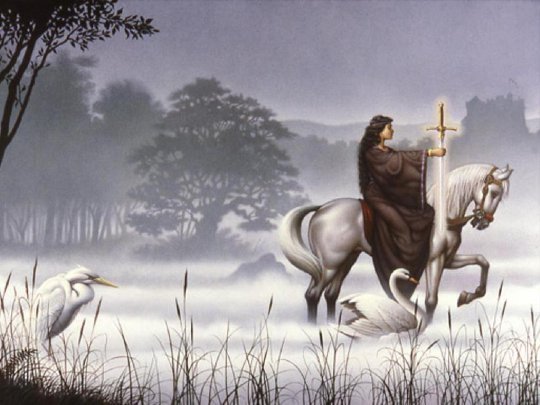
Remember that period of time of about 15 years, where absolutely everybody read this book and was obsessed with it? It could not have been bigger, and the fandom was Anne Rice huge, overlapping for several years with USENET and the early World Wide Web…but it’s since petered out.
Mists of Avalon’s popularity may be due to the most excellent case of hitting a demographic sweet spot ever. The book was a feminist retelling of the Arthurian Mythos where Morgan Le Fay is the main character, a pagan from matriarchal goddess religions who is fighting against encroaching Christianity and patriarchal forms of society coming in with it. Also, it made Lancelot bisexual and his conflict is how torn he is about his attraction to both Arthur and Guinevere.
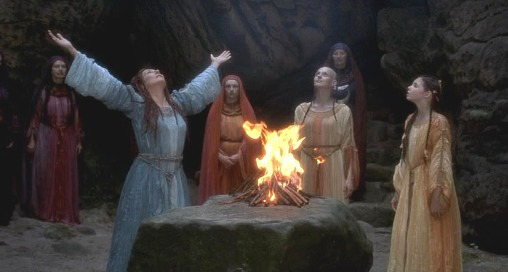
Remember, this novel came out in 1983 – talk about being ahead of your time! If it came out today, the reaction from a certain corner would be something like “it is with a heavy heart that I inform you that tumblr is at it again.”
Man, demographically speaking, that’s called “nailing it.” It used to be one of the favorite books of the kind of person who’s bookshelf is dominated by fantasy novels about outspoken, fiery-tongued redheaded women, who dream of someday moving to Scotland, who love Enya music and Kate Bush, who sell homemade needlepoint stuff on etsy, who consider their religious beliefs neo-pagan or wicca, and who have like 15 cats, three of which are named Isis, Hypatia, and Morrigan.
This type of person is still with us, so why did this novel fade in popularity? There’s actually a single hideous reason: after her death around 2001, facts came out that Marion Zimmer Bradley abused her daughters sexually. Even when she was alive, she was known for defending and enabling a known child abuser, her husband, Walter Breen. To say people see your work differently after something like this is an understatement – especially if your identity is built around being a progressive and feminist author.
Robotech
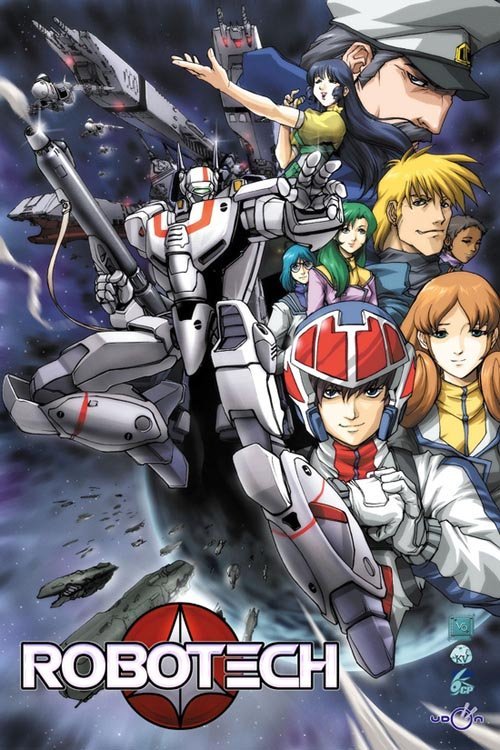
I try to break up my sections on dead fandoms into three parts: first, I explain the property, then explain why it found a devoted audience, and finally, I explain why that fan devotion and community went away. Well, in the case of Robotech, I can do all three with a single sentence: it was the first boy pilot/giant robot Japanimation series that shot for an older, teenage audience to be widely released in the West. Robotech found an audience when it was the only true anime to be widely available, and lost it when became just another import anime show. In the days of Crunchyroll, it’s really hard to explain what made Robotech so special, because it means describing a different world.

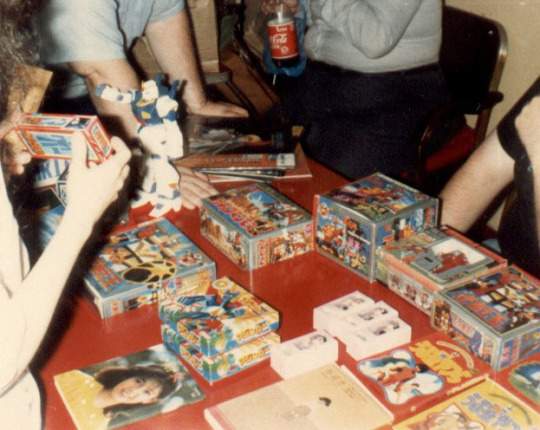
Try to imagine what it was like in 1986 for Japanime fans: there were barely any video imports, and if you wanted a series, you usually had to trade tapes at your local basement club (they were so precious they couldn’t even be sold, only traded). If you were lucky, you were given a script to translate what you were watching. Robotech though, was on every day, usually after school. You want an action figure? Well, you could buy a Robotech Valkyrie or a Minmei figure at your local corner FAO Schwartz.
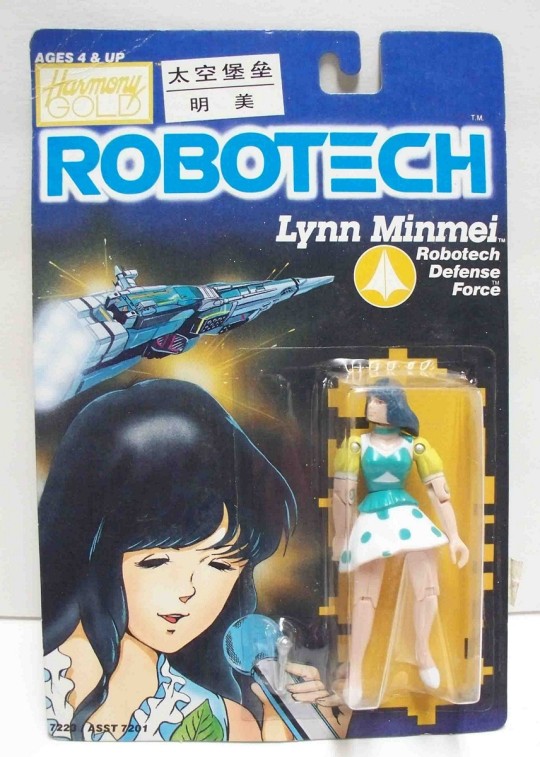
However, the very strategy that led to it getting syndicated is the very reason it was later vilified by the purists who emerged when anime became a widespread cultural force: strictly speaking, there actually is no show called “Robotech.” Since Japanese shows tend to be short run, say, 50-60 episodes, it fell well under the 80-100 episode mark needed for syndication in the US. The producer of Harmony Gold, Carl Macek, had a solution: he’d cut three unrelated but similar looking series together into one, called “Robotech.” The shows looked very similar, had similar love triangles, used similar tropes, and even had little references to each other, so the fit was natural. It led to Robotech becoming a weekday afternoon staple with a strong fandom who called themselves “Protoculture Addicts.” There were conventions entirely devoted to Robotech. The supposed shower scene where Minmei was bare-breasted was the barely whispered stuff of pervert legend in pre-internet days. And the tie in novels, written with the entirely western/Harmony Gold conception of the series and which continued the story, were actually surprisingly readable.
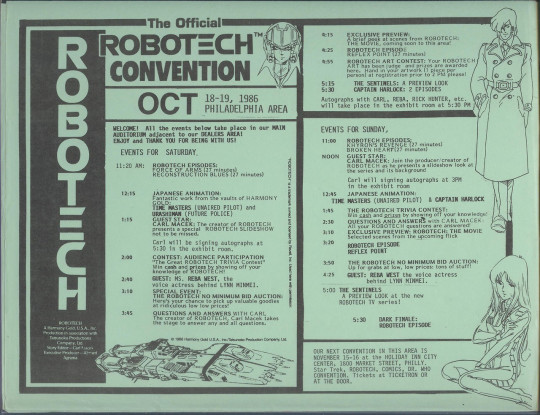
The final nail in the coffin of Robotech fandom was the rise of Sailor Moon, Toonami, Dragonball, and yes, Pokemon (like MC Hammer’s role in popularizing hip hop, Pokemon is often written out of its role in creating an audience for the next wave of cartoon imports out of insecurity). Anime popularity in the West can be defined as not a continuing unbroken chain like scifi book fandom is, but as an unrelated series of waves, like multiple ancient ruins buried on top of each other (Robotech was the vanguard of the third wave, as Anime historians reckon); Robotech’s wave was subsumed by the next, which had different priorities and different “core texts.” Pikachu did what the Zentraedi and Invid couldn’t do: they destroyed the SDF-1.
Legion of Super-Heroes
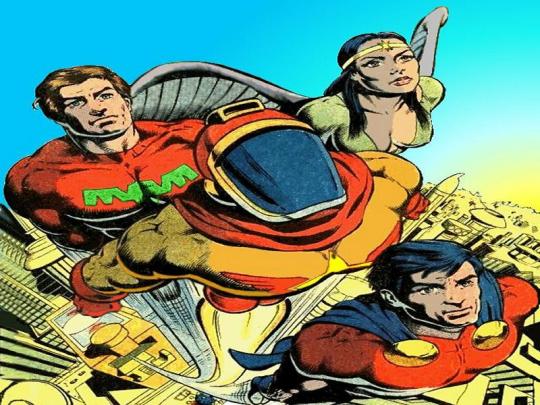
Legion of Superheroes was comic set in the distant future that combined superheroes with space opera, with a visual aesthetic that can best be described as “Star Trek: the Motion Picture, if it was set in a disco.”
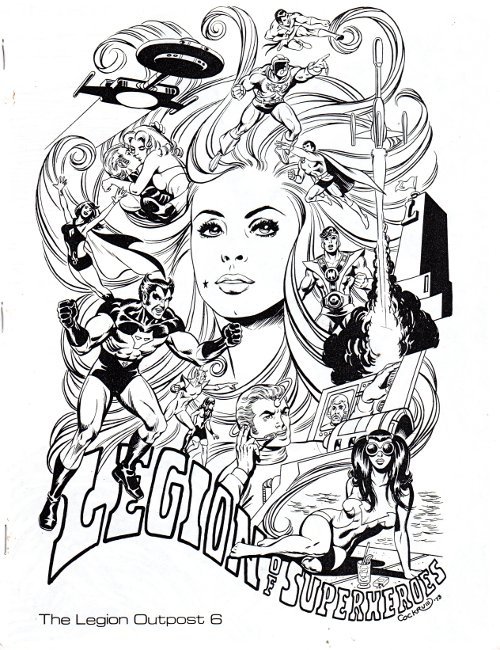
I’ve heard wrestling described as “a soap opera for men.” If that’s the case, then Legion of Super-Heroes was a soap opera for nerds. The book is about attractive 20-somethings who seem to hook up all the time. As a result, it had a large female fanbase, which, I cannot stress enough, is incredibly unusual for this era in comics history. And if you have female fans, you get a lot of shipping and slashfic, and lots of speculation over which of the boy characters in the series is gay. The fanon answer is Element Lad, because he wore magenta-pink and never had a girlfriend. (Can’t argue with bulletproof logic like that.) In other words, it was a 1970s-80s fandom that felt much more “modern” than the more right-brained, bloodless, often anal scifi fandoms that existed around the same time, where letters pages were just nitpicking science errors by model train and elevator enthusiasts.
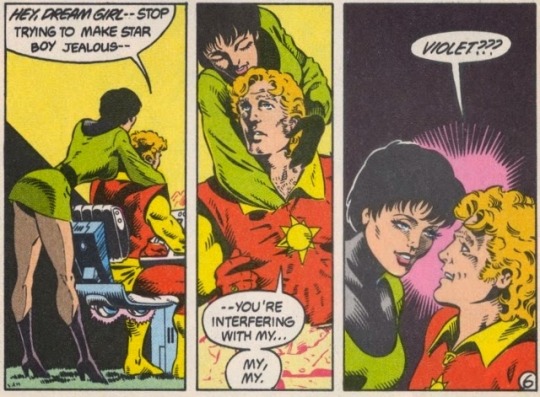
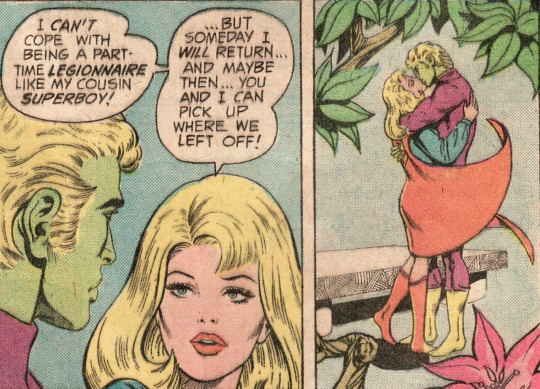
Legion Headquarters seemed to be a rabbit fuck den built around a supercomputer and Danger Room. Cosmic Boy dressed like Tim Curry in Rocky Horror. There’s one member, Duo Damsel, who can turn into two people, a power that, in the words of Legion writer Jim Shooter, was “useful for weird sex...and not much else.”
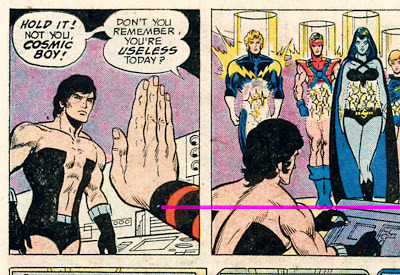
LSH was popular because the fans were insanely horny. This is, beyond the shadow of a doubt, the thirstiest fandom of all time. You might think I’m overselling this, but I really think that’s an under-analyzed part of how some kinds of fiction build a devoted fanbase.
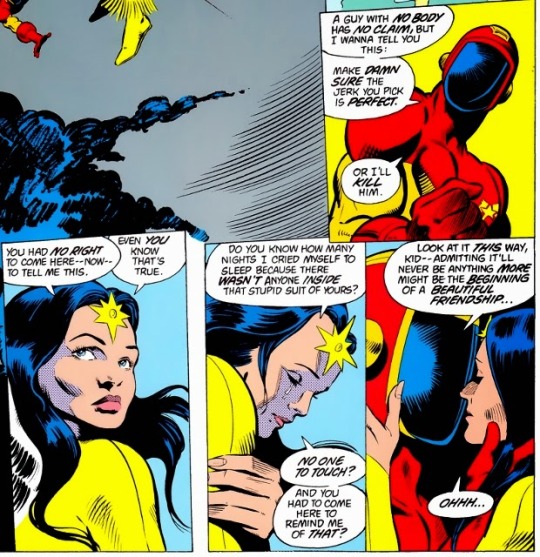
For example, a big reason for the success of Mass Effect is that everyone has a favorite girl or boy, and you have the option to romance them. Likewise, everyone who was a fan of Legion remembers having a crush. Sardonic Ultra Boy for some reason was a favorite among gay male nerds (aka the Robert Conrad Effect). Tall, blonde, amazonian telepath Saturn Girl, maybe the first female team leader in comics history, is for the guys with backbone who prefer Veronica over Betty. Shrinking Violet was a cute Audrey Hepburn type. And don’t forget Shadow Lass, who was a blue skinned alien babe with pointed ears and is heavily implied to have an accent (she was Aayla Secura before Aayla Secura was Aayla Secura). Light Lass was commonly believed to be “coded lesbian” because of a short haircut and her relationships with men didn’t work out. The point is, it’s one thing to read about the adventures of a superteam, and it implies a totally different level of mental and emotional involvement to read the adventures of your imaginary girlfriend/boyfriend.
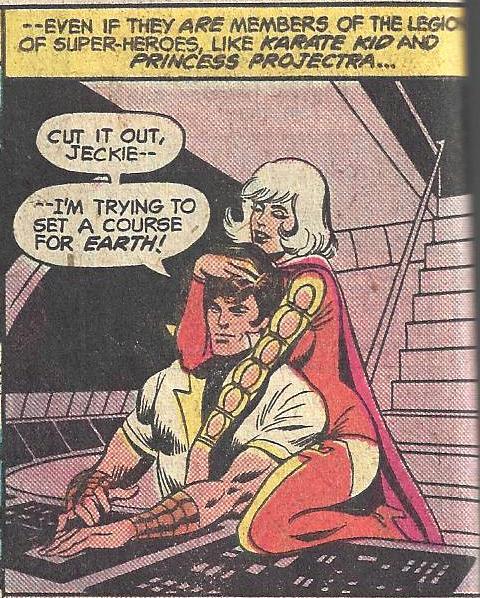
Now, I should point out that of all the fandoms I’ve examined here, LSH was maybe the smallest. Legion was never a top seller, but it was a favorite of the most devoted of fans who kept it alive all through the seventies and eighties with an energy and intensity disproportionate to their actual numbers. My gosh, were LSH fans devoted! Interlac and Legion Outpost were two Legion fanzines that are some of the most famous fanzines in comics history.
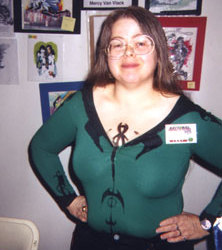
If nerd culture fandoms were drugs, Star Wars would be alcohol, Doctor Who would be weed, but Legion of Super-Heroes would be injecting heroin directly into your eyeballs. Maybe it is because the Legionnaires were nerdy, too: they played Dungeons and Dragons in their off time (an escape, no doubt, from their humdrum, mundane lives as galaxy-rescuing superheroes). There were sometimes call outs to Monty Python. Basically, the whole thing had a feel like the dorkily earnest skits or filk-singing at a con. Legion felt like it’s own fan series, guest starring Patton Oswalt and Felicia Day.
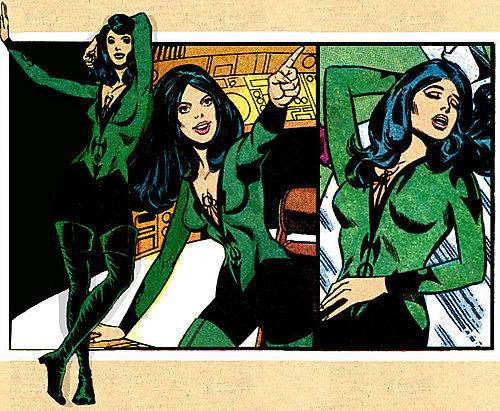
It helped that the boundary between fandom and professional was incredibly porous. For instance, pro-artist Dave Cockrum did covers for Legion fanzines. Former Legion APA members Todd and Mary Biernbaum got a chance to actually write Legion, where, with the gusto of former slashfic writers given the keys to canon, their major contribution was a subplot that explicitly made Element Lad gay. Mike Grell, a professional artist who got paid to work on the series, did vaguely porno-ish fan art. Again, it’s hard to tell where the pros started and the fandom ended; the inmates were running the asylum.
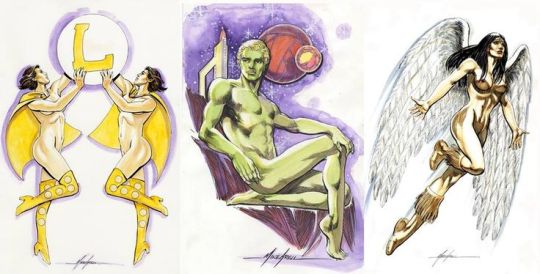
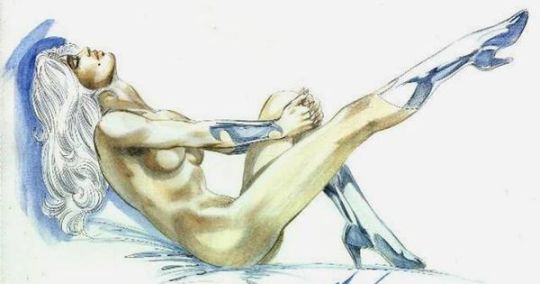
Mostly, Legion earned this devotion because it could reward it in a way no other comic could. Because Legion was not a wide market comic but was bought by a core audience, after a point, there were no self-contained one-and-done Legion stories. In fact, there weren’t even really arcs as we know it, which is why Legion always has problems getting reprinted in trade form. Legion was plotted like a daytime soap opera: there were always five different stories going on in every issue, and a comic involved cutting between them. Sure, like daytime soap operas, there’s never a beginning, just endless middles, so it was totally impossible for a newbie to jump on board...but soap operas know what they are doing: long term storytelling rewards a long term reader.
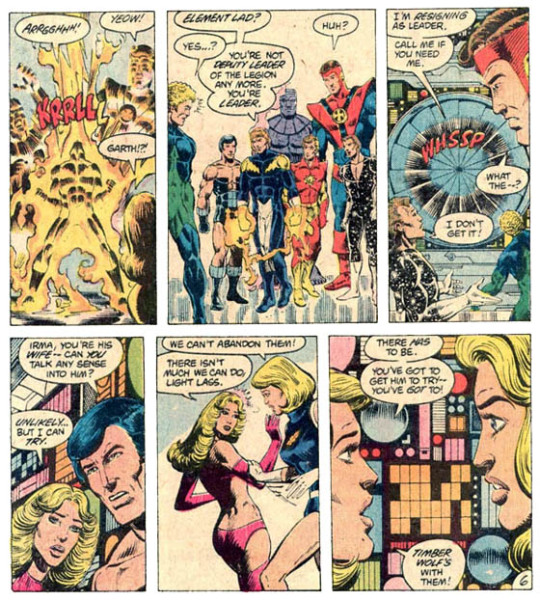
This brings me to today, where Legion is no longer being published by DC. There is no discussion about a movie or TV revival. This is amazing. Comics are a world where the tiniest nerd groups get pandered to: Micronauts, Weirdworld, Seeker 3000, and Rom have had revival series, for pete’s sake. It’s incredible there’s no discussion of a film or TV treatment, either; friggin Cyborg from New Teen Titans is getting a solo movie.
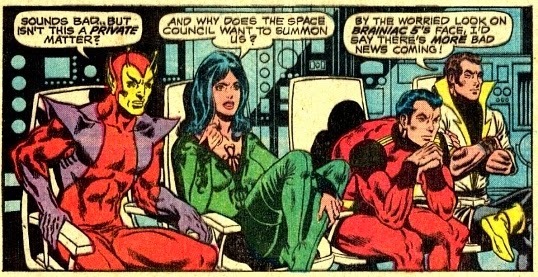
Why did Legion stop being such a big deal? Where did the fandom that supported it dissolve to? One word: X-Men. Legion was incredibly ahead of its time. In the 60s and 70s, there were barely any “fan” comics, since superhero comics were like animation is today: mostly aimed at kids, with a minority of discerning adult/teen fans, and it was success among kids, not fans, that led to something being a top seller (hence, “fan favorites” in the 1970s, as surprising as it is to us today, often did not get a lot of work, like Don MacGregor or Barry Smith). But as newsstands started to push comics out, the fan audience started to get bigger and more important…everyone else started to catch up to the things that made Legion unique: most comics started to have attractive people who paired up into couples and/or love triangles, and featured extremely byzantine long term storytelling. If Legion of Super-Heroes is going to be remembered for anything, it’s for being the smaller scale “John the Baptist” to the phenomenon of X-Men, the ultimate “fan” comic.
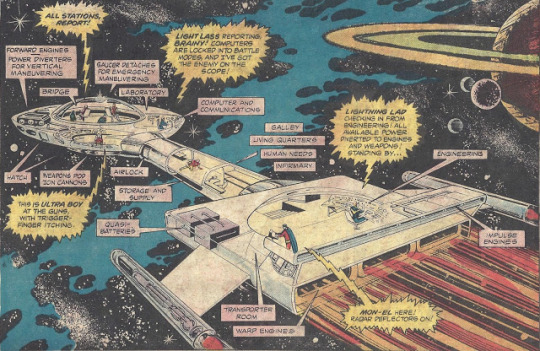
The other thing that killed Legion, apart from Marvel’s Merry Mutants, that is, was the r-word: reboots. A reboot only works for some properties, but not others. You reboot something when you want to find something for a mass audience to respond to, like with Zorro, Batman, or Godzilla.
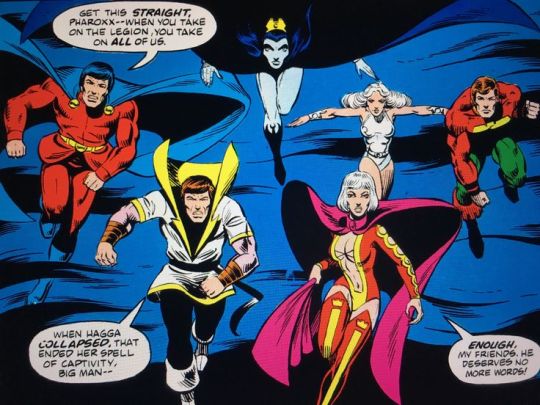
Legion, though, was not a comic for everybody, it was a fanboy/girl comic beloved by a niche who read it for continuing stories and minutiae (and to jack off, and in some cases, jill off). Rebooting a comic like that is a bad idea. You do not reboot something where the main way you engage with the property, the greatest strength, is the accumulated lore and history. Rebooting a property like that means losing the reason people like it, and unless it’s something with a wide audience, you only lose fans and won’t get anything in return for it. So for something like Legion (small fandom obsessed with long form plots and details, but unlike Trek, no name recognition) a reboot is the ultimate Achilles heel that shatters everything, a self-destruct button they kept hitting over and over and over until there was nothing at all left.
E. E. Smith’s Lensman Novels
The Lensman series is like Gil Evans’s jazz: it’s your grandparents’ favorite thing that you’ve never heard of.
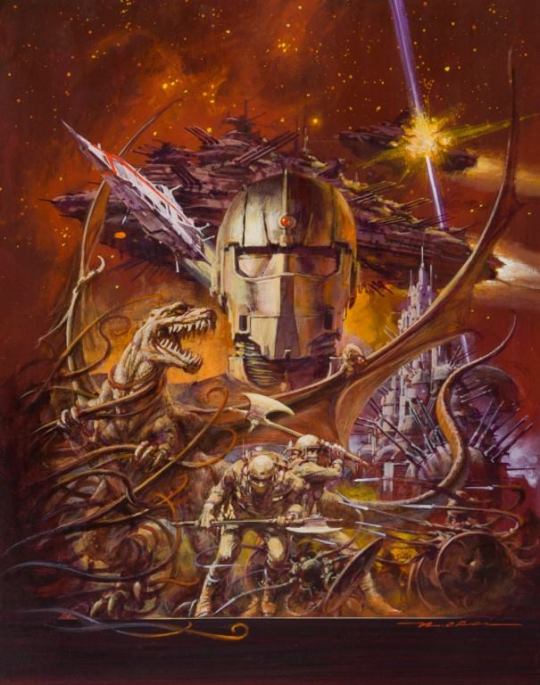
I mean, have you ever wondered exactly what scifi fandom talked about before the rise of the major core texts and cultural objects (Star Trek, Asimov, etc)? Well, it was this. Lensmen was the subject of fanfiction mailed in manilla envelopes during the 30s, 40s, and 50s (some of which are still around). If you’re from Boston, you might recognize that the two biggest and oldest scifi cons there going back to the 1940s, Boskone (Boscon, get it?) and Arisia, are references to the Lensman series. This series not only created space opera as we know it, but contributed two of the biggest visuals in scifi, the interstellar police drawn from different alien species, and space marines in power armor.
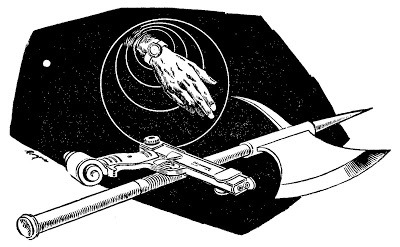
My favorite sign of how big this series was and how fans responded to it, was a great wedding held at Worldcon that duplicated Kimball Kinnison and Clarissa’s wedding on Klovia. This is adorable:
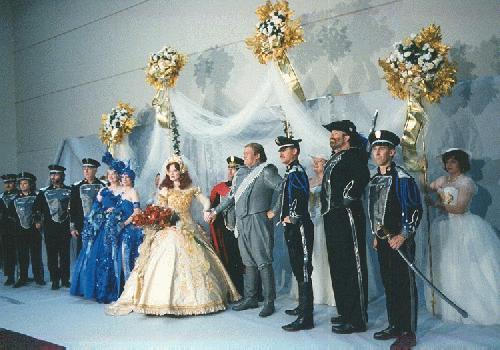
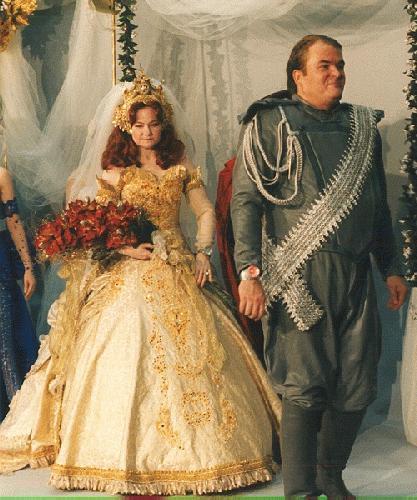
The basic story is pure good vs. evil: galactic civilization faces a crime and piracy wave of unprecedented proportions from technologically advanced pirates (the memory of Prohibition, where criminals had superior firearms and faster cars than the cops, was strong by the mid-1930s). A young officer, Kimball Kinnison (who speaks in a Stan Lee esque style of dialogue known as “mid-century American wiseass”), graduates the academy and is granted a Lens, an object from an ancient mystery civilization, who’s true purpose is unknown.
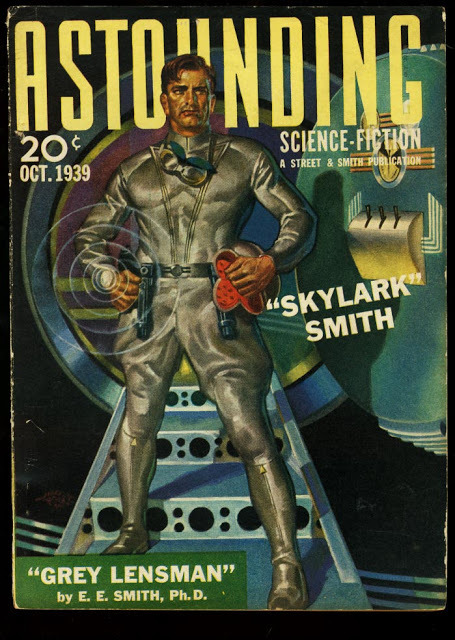
Lensman Kinnison discovers that the “crime wave” is actually a hostile invasion and assault by a totally alien culture that is based on hierarchy, intolerant of failure, and at the highest level, is ruled by horrifying nightmare things that breathe freezing poison gases. Along the way, he picks up allies, like van Buskirk, a variant human space marine from a heavy gravity planet who can do a standing jump of 20 feet in full space armor, Worsel, a telepathic dragon warrior scientist with the technical improvisation skills of MacGyver (who reads like the most sadistically minmaxed munchkinized RPG character of all time), and Nandreck, a psychologist from a Pluto-like planet of selfish cowards.
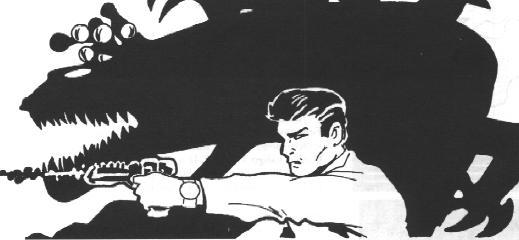
The scale of the conflict starts small, just skirmishes with pirates, but explodes to near apocalyptic dimensions. This series has space battles with millions of starships emerging from hyperspacial tubes to attack the ultragood Arisians, homeworld of the first intelligent race in the cosmos. By the end of the fourth book, there are mind battles where the reflected and parried mental beams leave hundreds of innocent bystanders dead. In the meantime we get evil Black Lensmen, the Hell Hole in Space, and superweapons like the Negasphere and the Sunbeam, where an entire solar system was turned into a vacuum tube.
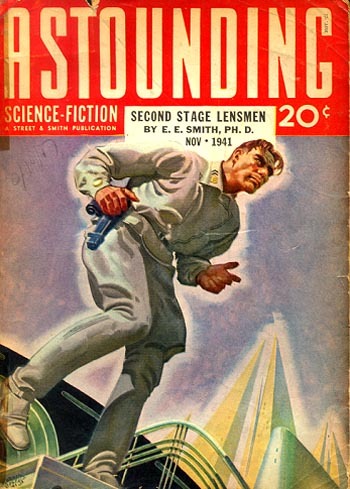
It’s not hard to understand why Lensmen faded in importance. While the alien Lensmen had lively psychologies, Lensman Kimball Kinnison was not an interesting person, and that’s a problem when scifi starts to become more about characterization. The Lensman books, with their love of police and their sexism (it is an explicit plot point that the Lens is incompatible with female minds – in canon there are no female Lensmen) led to it being judged harshly by the New Wave writers of the 1960s, who viewed it all as borderline fascist military-scifi establishment hokum, and the reputation of the series never recovered from the spirit of that decade.
Prisoner of Zenda
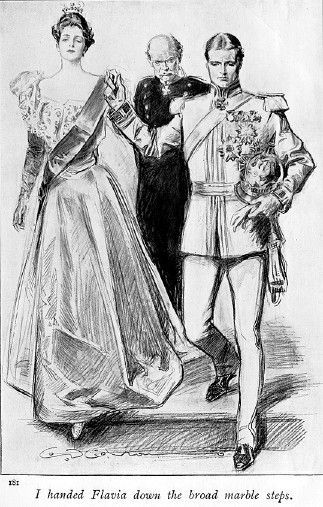
Prisoner of Zenda is a novel about a roguish con-man who visits a postage-stamp, charmingly picturesque Central European kingdom with storybook castles, where he finds he looks just like the local king and is forced to pose as him in palace intrigues. It’s a swashbuckling story about mistaken identity, swordfighting, and intrigue, one part swashbuckler and one part dark political thriller.
The popularity of this book predates organized fandom as we know it, so I wonder if “fandom” is even the right word to use. All the same, it inspired fanatical dedication from readers. There was such a popular hunger for it that an entire library could be filled with nothing but rip-offs of Prisoner of Zenda. If you have a favorite writer who was active between 1900-1950, I guarantee he probably wrote at least one Prisoner of Zenda rip-off (which is nearly always the least-read book in his oeuvre). The only novel in the 20th Century that inspired more imitators was Sherlock Holmes. Robert Heinlein and Edmond “Planet Smasher” Hamilton wrote scifi updates of Prisoner of Zenda. Doctor Who lifted the plot wholesale for the Tom Baker era episode, “Androids of Tara,” Futurama did this exact plot too, and even Marvel Comics has its own copy of Ruritania, Doctor Doom’s Kingdom of Latveria. Even as late as the 1980s, every kids’ cartoon did a “Prisoner of Zenda” episode, one of the stock plots alongside “everyone gets hit by a shrink ray” and the Christmas Carol episode.
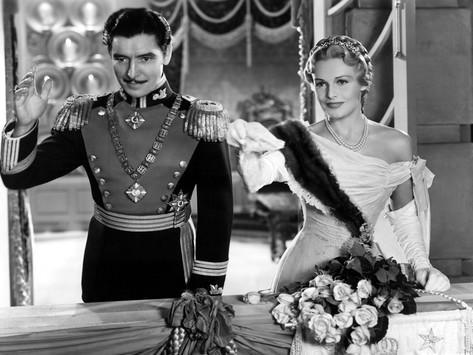
Prisoner of Zenda imitators were so numerous, that they even have their own Library of Congress sub-heading, of “Ruritanian Romance.”
One major reason that Prisoner of Zenda fandom died off is that, between World War I and World War II, there was a brutal lack of sympathy for anything that seemed slightly German, and it seems the incredibly Central European Prisoner of Zenda was a casualty of this. Far and away, the largest immigrant group in the United States through the entire 19th Century were Germans, who were more numerous than Irish or Italians. There were entire cities in the Midwest that were two-thirds German-born or German-descent, who met in Biergartens and German community centers that now no longer exist.
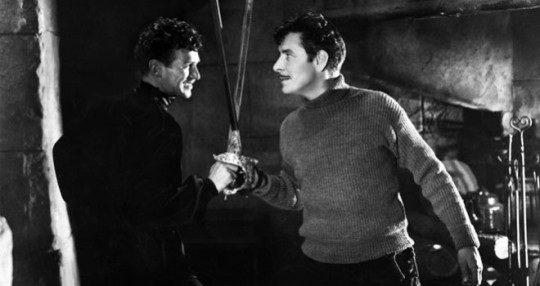
Kurt Vonnegut wrote a lot about how the German-American world he grew up in vanished because of the prejudice of the World Wars, and that disappearance was so extensive that it was retroactive, like someone did a DC comic-style continuity reboot where it all never happened: Germans, despite being the largest immigrant group in US history, are left out of the immigrant story. The “Little Bohemias” and “Little Berlins” that were once everywhere no longer exist. There is no holiday dedicated to people of German ancestry in the US, the way the Irish have St. Patrick’s Day or Italians have Columbus Day (there is Von Steuben’s Day, dedicated to a general who fought with George Washington, but it’s a strictly Midwest thing most people outside the region have never heard of, like Sweetest Day). If you’re reading this and you’re an academic, and you’re not sure what to do your dissertation on, try writing about the German-American immigrant world of the 19th and 20th Centuries, because it’s a criminally under-researched topic.
A. Merritt
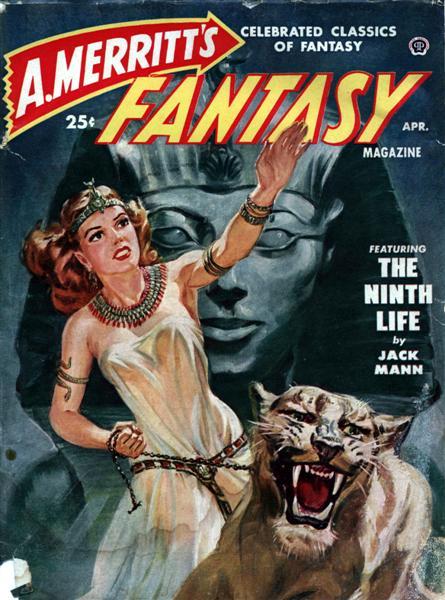
Pop quiz: who was the most popular and influential fantasy author during the 1930s and 40s?
If you answered Tolkien or Robert E. Howard, you’re wrong - it was actually Abraham Merritt. He was the most popular writer of his age of the kind of fiction he did, and he’s since been mostly forgotten. Gary Gygax, creator of Dungeons and Dragons, has said that A. Merritt was his favorite fantasy and horror novelist.
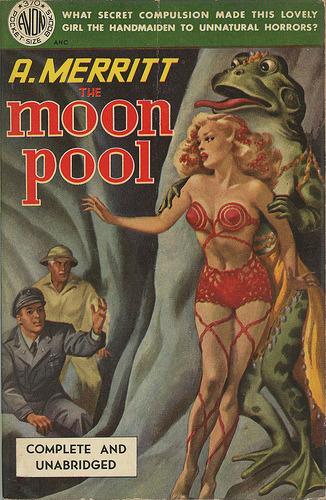
Why did A. Merritt and his fandom go away, when at one point, he was THE fantasy author? Well, obviously one big answer was the 1960s counterculture, which brought different writers like Tolkien and Lovecraft to the forefront (by modern standards Lovecraft isn’t a fantasy author, but he was produced by the same early century genre-fluid effluvium that produced Merritt and the rest). The other answer is that A. Merritt was so totally a product of the weird occult speculation of his age that it’s hard to even imagine him clicking with audiences in other eras. His work is based on fringe weirdness that appealed to early 20th Century spiritualism and made sense at the time: reincarnation, racial memory, an obsession with lost race stories and the stone age, and weirdness like the 1920s belief that the Polar Arctic is the ancestral home of the Caucasian race. In other words, it’s impossible to explain Merritt without a ton of sentences that start with “well, people in the 1920s thought that...” That’s not a good sign when it comes to his universality.
That’s it for now. Do you have any suggestions on a dead fandom, or do you keep one of these “dead” fandoms alive in your heart?
3K notes
·
View notes